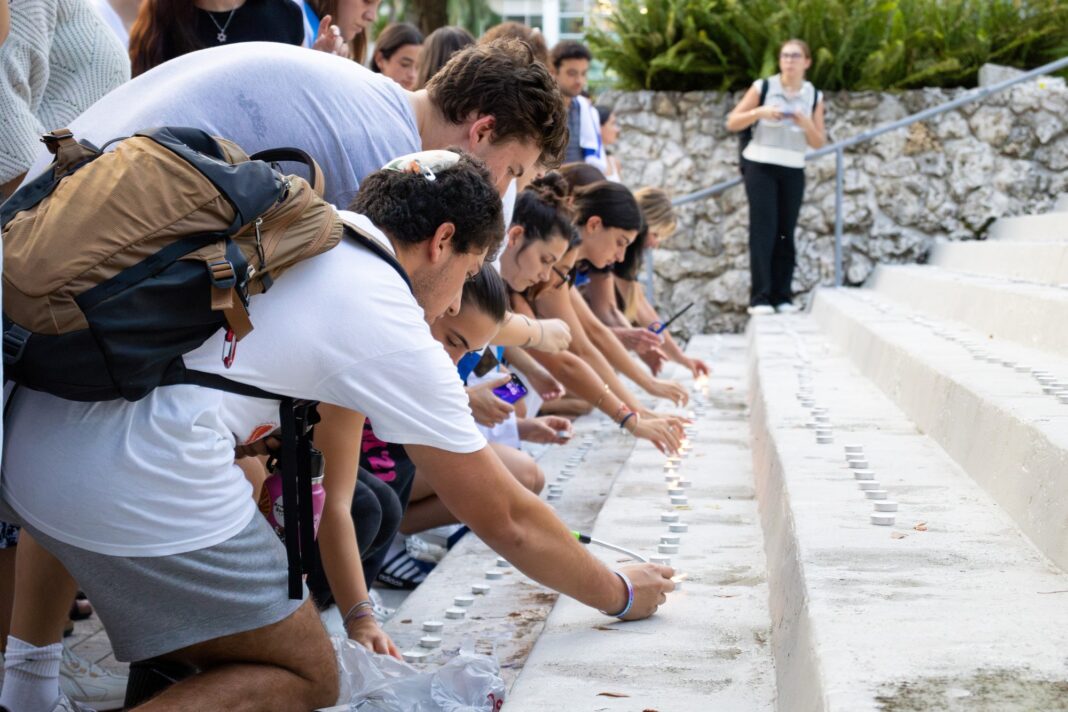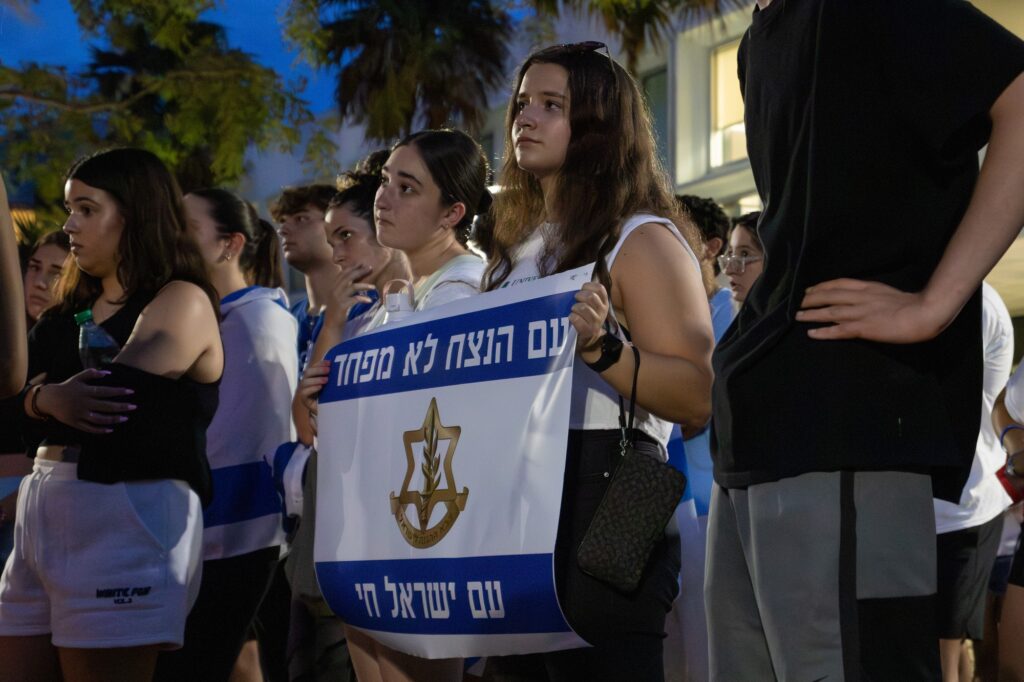
The Israeli government officially declared war on Hamas, the Palestinian-Islamist militant group, on Sunday Oct. 8 in response to Saturday’s deadly assault on Israel. The attack has left over 700 Israelis dead and 2,500 wounded as of Monday, Oct. 9, the majority of whom are civilians.
According to the Jewish Telegraphic Agency, the attack resulted in the largest number of deaths in the Jewish community in a 24-hour period since the Holocaust.
Many political analysts have referred to the attack as “Israel’s 9/11,” and Israeli Prime Minister Benjamin Netanyahu has said the war will fundamentally “change the Middle East” for good.
In the days since, the University of Miami community has reacted to the ongoing violence taking place in the region. In response to the conflict, UM President Julio Frenk issued a statement in solidarity with Israel on Monday afternoon.
“We stand in solidarity with the people of Israel, with all those impacted by the violence, and with all who seek peace.” Frenk said. “Our hearts break for Israelis and for the Jewish state, as well as for the innocent Palestinians, Druze, Bedouins, and others who live within its borders and the region.”
He then went on to discuss the University’s “deep ties to Israel” through alumni, students and faculty, along with his personal connection to the country. Frenk traveled to Israel in July 2023 as part of a sponsored trip through Project Interchange with UM Hillel.
The conflict began in an unprecedented attack from Hamas that launched an estimated 2,200 missiles into Israeli territory and took over 22 Israeli towns and military bases.
“In prior years, we had seen Israel and Hamas put as some sort of moral equivalency, as if there is any comparison between a civilized democratic government army acting in defense of its people and a violent terrorist organization,” said an anonymous member of UM’s Students Supporting Israel (SSI) executive board. “What we saw was a complete disruption of this false narrative – there is no equivalency.”
The member also has family in Israel and has shared what they’re experiencing.
“They haven’t experienced war, they’ve experienced genocide. Every day new friends and colleagues’ names are on a list of the dead. There is no anguish like this is now. But it will only fuel them to come back better and stronger than ever before.”

Israel retaliated by launching airstrikes on Saturday, Oct. 7, targeting the Gaza territory that Hamas controls. These include the bombing of Watan Towers, as well as striking Jaibalia, a refugee camp north of Gaza City.
One student, who has chosen to remain anonymous, has called the Palestine region home for over 10 years. For them, the past few days have been spent watching the destruction from afar, concerned for their family members in Gaza.
“The situation that is happening is extremely terrifying for me and for every Palestinian. This situation is not ideal, we are all scared. I’m abroad while attacks are taking place in my home, Palestine,” they said.
Israel’s airstrikes to the Gaza Strip have killed more than 687 Palestinians and left 2,900 wounded as of Tuesday, Oct. 10.
Israel’s response reflects Netanyahu’s preparation for an extensive war ahead, stating that the terrorist group will pay an “unprecedented price” for the bloodshed it has caused.
Hamas infiltrated Israel through air, land and sea, making it the deadliest assault in decades for the Israeli-Palestinian conflict.
“In the past few days, our worst fears have been realized. Six hundred plus Israelis have been murdered in cold blood,” said Abigail Schcolnik, co-president of UM Hillel and a cabinet member for Hillel International. “Hundreds have been taken hostage. Thousands are injured. I pray for peace, but what does that mean?”
Videos surfacing from the Supernova music festival, an event held in southern Israel to celebrate the Jewish holiday of Sukkot, shows civilians running as they dodge bullets from armed Hamas fighters. Over 250 festival goers were killed at the event, including children and soldiers.
The number of hostages taken by Hamas is unknown, yet over 100 are believed to have been captured and are scattered throughout locations in Gaza.
South Florida has reacted strongly to the conflict, with protests breaking out among opposing groups in Fort Lauderdale Sunday afternoon. A pro-Palestine rally stood adjacent to a gathering of Floridians in solidarity for Israel, leading to a hostile clash that was broken up by police.
Contentious discussion on the conflict has also been prominent on social media and on college campuses like UM.
“Recently, during moments like this, Zionist students have had to mask their identity, mute their opinions, hide from their professors…” Schcolnik said. “It’s different this time though. We will not be bystanders in the face of justice. We will stand together and fight for the people of Israel.”
UM Hillel is providing community gatherings during this time that show support for Israel, with the first gathering having taken place this past Monday.
“We speak on behalf of UM’s Jewish community when we express appreciation for the administration at Miami and their support at a time that has been unbelievably traumatic for us.” said the SSI executive board member.
U.S. foreign and military officials suspect the reasoning behind Hamas’ attack against Israel on Oct. 7 was to drive a wedge between critical peace agreement negotiations that are happening between Israel, Saudi Arabia and the United States.
However, some Palestinians claim that the longstanding violence from Israeli forces is the reason behind Hamas’ attack. This past July, Israel forces air-raided a refugee camp in the city of Jenin, killing and injuring dozens in the occupied West Bank controlled by Palestinian National Authority.
“It already is hard enough being far from my family and friends during these times, seeing what’s happening to my country from far, let alone being surrounded by entitled Westerners who think they have the understanding of our struggle with colonialism for the past 75 years,” the Palestinian student said.
“The events of the past 75 plus years have profoundly affected an entire nation, resulting in our oppression, subjugation and exile. It’s important to comprehend the nuanced history and context of the situation,” they added.
The leader of Hamas’ military, Muhammad Deif, stated that the group launched the “operation” so that Israel will “understand that the time of their rampaging without accountability has ended.”
Hamas’ “accountability,” though, has included brutal attacks on civilian Israelis. In one instance, an Israeli woman found out her grandmother was killed through a video posted by Hamas on her grandmother’s facebook. The video was filmed by militants on the woman’s phone, and showed her deceased body.
The leader has also cited recent police raids on the Al-Aqsa Mosque in Jerusalem during Ramadan, the third holiest site for Muslims, as contributing to the attack.
Jana Faour, a sophomore psychology and criminology double-major on the pre-med track, is the daughter of Lebanese parents who have witnessed the targeting of holy sites in Palestinian territories including Gaza and the West Bank.
“Mosques, the Muslim place of worship, are infiltrated and people praying peacefully are attacked. The loss of innocent lives is a tragedy, and it is one that has been happening for years.” Faour said.
The Gaza Strip is one of the most densely populated areas in the world, and control over the territory has been a contentious issue in the Middle East between Israelis and Palestinians, contributing to the longstanding conflict within the region.
Tensions first arose in the early 20th century. The 1948 departure of British rule in the area of Gaza was a significant catalyst for the conflict, especially as Israel gained official statehood the same year.
“What people fail to realize is that this is an issue of colonization,” Faour said. “The conversation of violence and lives lost is now coming up as if it is the first time it has happened due to the occupation, [yet] this has been the reality of Palestinian lives for over 50 years.”
Despite conflict between the two states, they share a limited number of resources such as food, fuel and electricity. On Monday, Oct. 9, the Israeli Defense Minister declared a “full siege” of the Gaza enclave, cutting off any supply of these resources.
“I don’t see any scenario out of this where there isn’t a tremendous loss of life, which is a true, true shame and disgusting thing for both sides. It’s a pity for everybody involved, not just one side or the other.” said the SSI executive board member.





